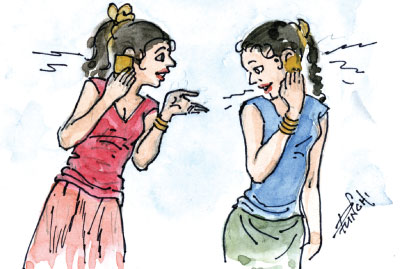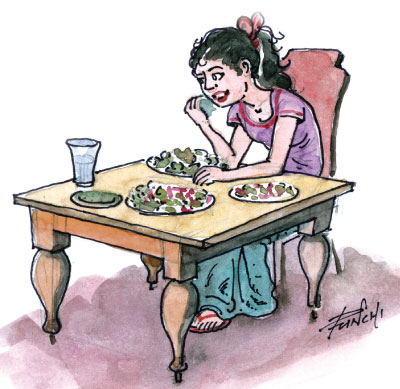|

by R. S. Karunaratne
How much money?
How many friends?
So many worlds,
so much to do,
so little done.
-Alfred Lord Tennyson
 |
|
Lots of people use mobile
phones |
We use 'much' with singular (uncountable) nouns.
I don't listen to much music.
Jean doesn't know much English.
We haven't got much time.
We don't play much cricket.
Moneragala doesn't get much rain.
They don't eat much fish.
There is much traffic on the road today.
We use 'how much' with singular (uncountable) nouns.
How much water do you drink?
How much is the bus fare to Colombo?
How much money have you brought?
How much can we sell?
How much is this dictionary?
We use 'much' mostly in questions.
Do you get much rain in this area?
Does the patient get much sleep?
Do you have much time to see films?
Do you do much work in office?
Many
We use 'many' with plural nouns.
Do you go to many concerts?
I don't have many clothes.
There were many people at the meeting.
Are there many women in your workplace?
I have travelled to many countries.
Not many tourists visit our town.
How many words have you memorised?
We use 'how many' with plural nouns.
How many friends do you have?
How many men were there in the room?
How many countries have you visited?
How many biscuits has she eaten?
How many books have you written?
 |
|
She eats a lot of
vegetables |
'A lot of' and 'lots of' are common in informal English. They have
the same meaning as 'much' and 'many.'
I haven't got a lot of friends.
We haven't got a lot of time.
Rich people have lots of money.
She has lots of friends.
We use 'a lot of' or 'lots of' before singular (uncountable) nouns.
A lot of her work is good.
Lots of her work is good.
When we use 'a lot of' or 'lots of' with a countable plural noun, a
plural verb is used.
A lot of his friends have gone abroad.
Lots of his relatives are living abroad.
Lots of people use mobile phones.
There are lots of bookshops in this town.
A lot of things have to change.
'A lot of' or 'lots of' are more natural than 'much' or 'many.'
She eats a lot of vegetables.
We bought a lot of books at the International Book Fair.
Lots of tourists climb Sri Pada.
There are a lot of religious places in our country.
Lots of people are unemployed.
There are lots of hotels in Colombo.
He has a lot of plans for the future.
Match words and meanings
Here's an exciting way to enrich your vocabulary. Match the words in
column 'A' with their meanings in column 'B' and check your answers with
the key. The first has been done for you.
[Column A]
A 1. death toll
... 2. death trap
... 3. death wish
... 4. debacle
... 5. debar
... 6. debase
... 7. debatable
... 8. debate
... 9. debilitate
... 10. debility
... 11. debit
... 12. debonair
... 13. debris
... 14. debt
... 15. debtor
... 16. debunk
... 17. debut
... 18. decade
... 19. decadence
... 20. decamp
... 21. decapitate
... 22. decay
... 23. decease
... 24. deceit
... 25. decelerate
[Column B]
A. the number of people who die in an event
B. a complete failure
C. to reduce the quality of something
D. to make someone physically weak
E. someone who owes money to others
F. low moral standards and behaviour
G. to leave suddenly without telling anyone
H. to cut off the head of a person
I. attractive
J. money taken out of bank account
K. something that is very dangerous
L. broken pieces of something large
M. to show that something is less important
N. public performance for the first time
O. a serious discussion of a subject
P. not certain
Q. physical weakness
R. money owed to someone else
S. a period of ten years
T. to become gradually damaged
U. an act of keeping the truth hidden
V. to go more slowly
W. a person's death
X. to stop someone from doing something
Y. a desire for death
Key:
2. K 3. Y 4. B 5. X 6. C 7. P 8. O 9. D 10. Q 11. J 12. I 13. L 14. R
15. E 16. M 17. N 18. S 19. F 20. G 21. H 22.T 23. W 24. U 25. V |

